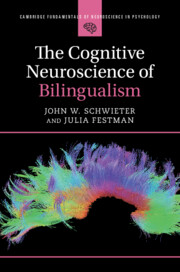Book contents
- The Cognitive Neuroscience of Bilingualism
- Cambridge Fundamentals of Neuroscience in Psychology
- The Cognitive Neuroscience of Bilingualism
- Copyright page
- Contents
- Figures
- Tables
- Acknowledgments
- Chapter One Theories and Methods in the Cognitive Neuroscience of Bilingualism
- Chapter Two Neural Representations and Language Processing in the Bilingual Brain
- Chapter Three Bilingualism, Language Development, and Brain Plasticity
- Chapter Four Aphasia and the Bilingual Brain
- Chapter Five Cross-Linguistic Effects of Bilingualism
- Chapter Six Bilingual Lexical and Conceptual Memory
- Chapter Seven Cognitive and Neurocognitive Effects of Bilingualism
- Chapter Eight Conclusion
- References
- Index
- References
Chapter One - Theories and Methods in the Cognitive Neuroscience of Bilingualism
An Introduction
Published online by Cambridge University Press: 01 October 2023
- The Cognitive Neuroscience of Bilingualism
- Cambridge Fundamentals of Neuroscience in Psychology
- The Cognitive Neuroscience of Bilingualism
- Copyright page
- Contents
- Figures
- Tables
- Acknowledgments
- Chapter One Theories and Methods in the Cognitive Neuroscience of Bilingualism
- Chapter Two Neural Representations and Language Processing in the Bilingual Brain
- Chapter Three Bilingualism, Language Development, and Brain Plasticity
- Chapter Four Aphasia and the Bilingual Brain
- Chapter Five Cross-Linguistic Effects of Bilingualism
- Chapter Six Bilingual Lexical and Conceptual Memory
- Chapter Seven Cognitive and Neurocognitive Effects of Bilingualism
- Chapter Eight Conclusion
- References
- Index
- References
Summary
In this chapter, we consider different definitions of bilingualism, underscoring the reality that there are various aspects which should be taken into account when investigating bilingualism, particularly when designing studies and choosing participants. Bilingualism is a complex construct and should be viewed on a continuum. Crucially, many key details about bilinguals’ backgrounds need to be reported in studies to make results comparable and clearly linkable to the specific study sample. Relative proficiency level seems to be the most influential factor, but it is by no means the only factor relevant for studying bilingualism. Rather, individual differences and their variability, dynamically related dimensions and their interaction over time, speech environment and their changes, language use habits, socioeconomic background, and so on have been reported to influence language processing and even brain function to some extent.
Keywords
- Type
- Chapter
- Information
- The Cognitive Neuroscience of Bilingualism , pp. 1 - 19Publisher: Cambridge University PressPrint publication year: 2023



